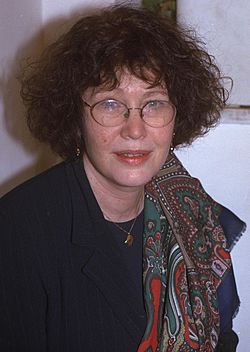Dahlia Ravikovitch facts for kids
Quick facts for kids
Dahlia Ravikovitch
|
|
|---|---|

Dahlia Ravikovitch, 1997
|
|
| Born | November 17, 1936 |
| Died | August 21, 2005 (aged 68) |
| Nationality | Israeli |
| Occupation | Poet |
Dahlia Ravikovitch (born November 17, 1936 – died August 21, 2005) was an amazing Israeli poet. She also worked as a translator and was a strong supporter of peace. Her poems are still loved and studied today.
Contents
Life Story of Dahlia Ravikovitch
Early Life and Childhood
Dahlia Ravikovitch was born in Ramat Gan, a city in what was then called British Mandate of Palestine. This was on November 27, 1936. She was very smart and learned to read and write when she was just three years old.
Her father, Levi, was an engineer who came from Russia. Her mother, Michal, was a teacher. When Dahlia was six years old, her father sadly passed away.
Moving and Finding Her Voice
After her father's death, Dahlia moved with her mother to a kibbutz, which is a community farm. However, she didn't quite fit into the community life there. So, at age 13, she moved to a foster home in Haifa. She lived in a few different foster homes during her teenage years.
It was during her time in Haifa that she wrote her very first poem. It was called "Painting." This poem showed the difference between the bright blue of the sea and the more serious feelings she had inside.
Adult Life and Work
Dahlia married young, at 18, but it didn't last long. She had one son named Ido Kalir. After serving in the Israel Defense Forces, she studied at the Hebrew University of Jerusalem.
She worked as a journalist, writing for newspapers, and also as a high school teacher. Dahlia was also a talented translator. She translated famous books like Mary Poppins into Hebrew. She also translated poems by well-known writers like W. B. Yeats and Edgar Allan Poe.
Dahlia was very active in the Israeli peace movement. She worked with artists, musicians, and other public figures from her home in Tel Aviv. They all wanted to find peace, fairness, and social justice for everyone.
Dahlia Ravikovitch passed away on August 21, 2005.
Dahlia Ravikovitch's Writing Career
Becoming a Poet
Dahlia Ravikovitch's first poems appeared in a Hebrew poetry magazine called Orlogin (which means "Hourglass"). The editor, Avraham Shlonsky, saw her talent and encouraged her to become a writer.
Her first book of poems, The Love of an Orange, was published in 1959. This book quickly made her one of Israel's most important young poets.
Poetic Style and Themes
In her early poems, Dahlia showed that she was very skilled with traditional poetry rules. But she always kept her unique and sensitive voice. As she wrote more, her style became a bit more like everyday speech.
One of her most famous poems, "The End of a Fall" (also known as "The Reason for Falling"), was published in 1987. This poem, like many of her others, can make you feel many emotions. It makes you think deeply and can even have a political message. For example, it says: "If a man falls from a plane in the middle of the night / only God can lift him up..."
A literary expert named Nili Rachel Scharf Gold has studied Dahlia's early poems. She believes that the city of Haifa and its scenery were very important to understanding poems like "Painting." Nili Gold also suggests that another famous poem, "Hovering at a Low Altitude," should be seen as a personal poem, not just a political one.
Published Works and Legacy
Dahlia Ravikovitch published ten books of poetry in Hebrew. Besides poems, she also wrote short stories and books for children. Many of her poems were turned into popular songs. Her poem Booba Memukenet (which means "Clockwork Doll") is one of her best-known works.
Her poems are taught in schools and universities around the world. For example, the University of Pennsylvania held an event in her honor in 2006. Dahlia Ravikovitch's poetry has been translated into 23 different languages, showing how much her work is appreciated globally.
Awards and Recognition
Dahlia Ravikovitch received many important awards for her amazing poetry:
- In 1987, she won the Bialik Prize for literature, sharing it with Moshe Dor.
- In 1998, she was given the prestigious Israel Prize for poetry. This is one of the highest honors in Israel.
- In 2005, she won the Prime Minister's Prize for Hebrew Literary Works.
- Other awards she received include the Brenner Prize and the Shlonsky Prize.
Books Translated into English
If you want to read Dahlia Ravikovitch's poems in English, here are some books:
- Dress Of Fire (published in 1978)
- The Window (published in 1989)
- Hovering at a Low Altitude: The Collected Poetry of Dahlia Ravikovitch (published in 2009)
See also
- List of Israel Prize recipients
- List of peace activists
 In Spanish: Dalia Ravikovitx para niños
In Spanish: Dalia Ravikovitx para niños
Images for kids
 | Kyle Baker |
 | Joseph Yoakum |
 | Laura Wheeler Waring |
 | Henry Ossawa Tanner |


